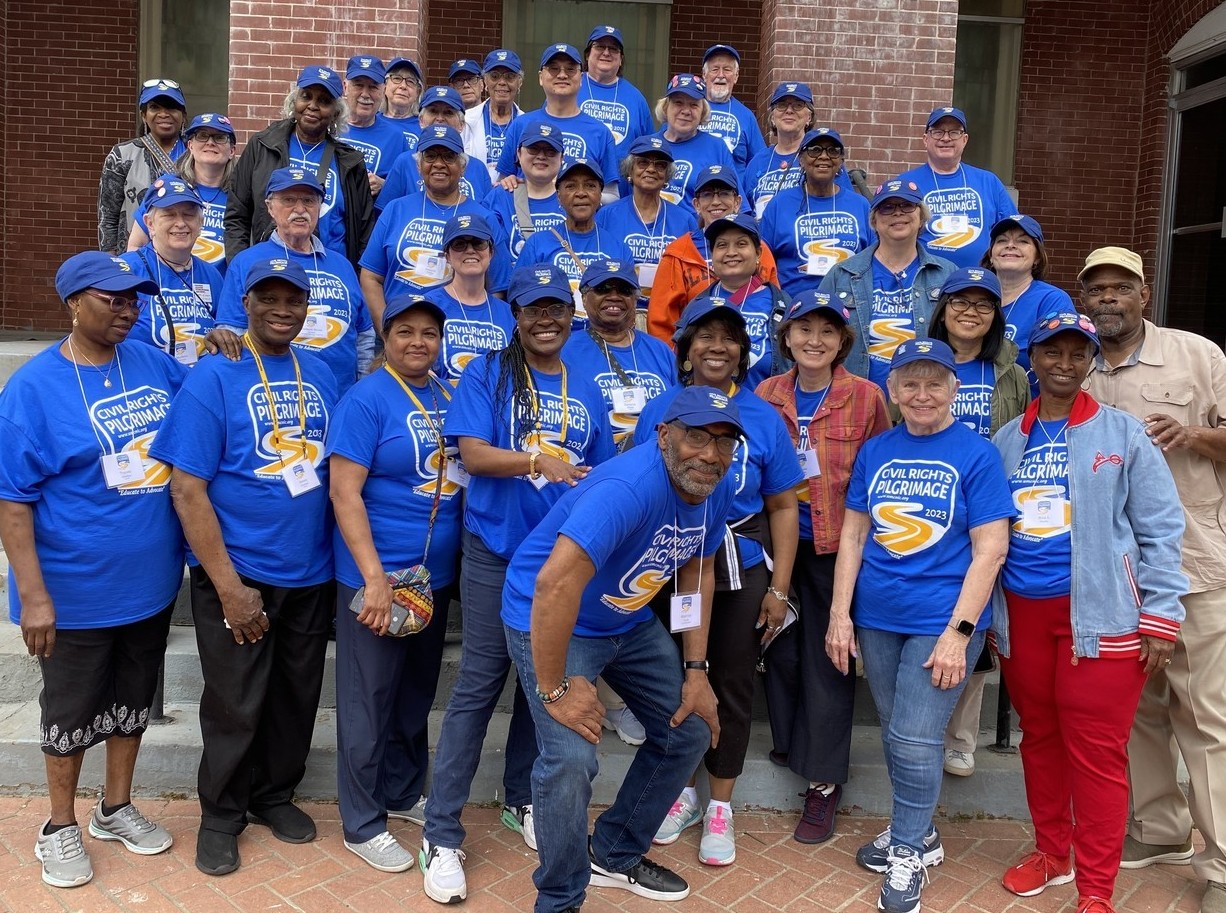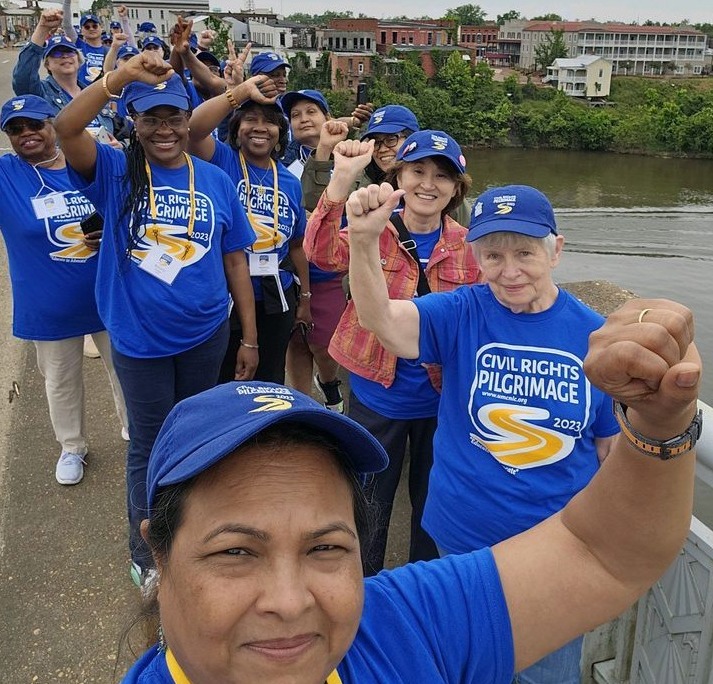Movement in the City, Melrose Park, Suffers Fire
A fire briefly burned in Movement in the City’s (new faith community) Melrose Park campus this morning. Firefighters, who rushed from a nearby station, quickly extinguished the…
In late April 2023, a racially diverse group of 37 clergy and lay members from 20 churches in the Northern Illinois Conference embarked on a six-day Civil Rights Pilgrimage. This journey helped the pilgrims remember, lament, reconcile, and strengthen their resolve to end racism and to share with others what they learned and experienced.
Pilgrims visited the 16th Street Baptist Church in Birmingham, Ala., where four Klu Klux Klan members detonated a bomb just before worship service started on Sept. 15, 1963. The explosion killed four girls: three 14-year-olds and one 11-year-old. The church building was also greatly damaged. The church has since been restored and its beautiful sanctuary accommodates worshippers every Sunday and visitors daily to remember the sacrifices made for freedom.

The Legacy Museum in Montgomery, Alabama—erected on the site of a warehouse where enslaved persons were shackled and detained before being auctioned off with animals and other goods—was another stop on the pilgrimage. The museum puts the transatlantic slave trade into sharp focus, reminding us America was founded on the backs of 12 million persons who were stolen and trafficked from Africa. (Two million of them died on the ocean voyage and their bodies were tossed callously into the ocean.) The museum also presents visitors with the stark realities of lynching, Jim Crow–era terrorism, and mass incarnation.
Pilgrims also visited The National Memorial for Peace and Justice in Montgomery, Ala. It is an outdoor monument of 805 suspended steel rectangles, on which the names of lynched individuals are engraved. Over 9,500 people were lynched in America (including in Illinois), without any kind of due process, trials, or even in many cases, accusation.
The Equal Justice Initiative. founded by Bryan Stevenson, author of Just Mercy: A Story of Justice and Redemption, established this museum and memorial with the purpose of changing the narrative about race in this country. This parallels the work of many in the United Methodist Church.
Rev. Marcus Tabb, a participant in the pilgrimage, says that “the Civil Rights Pilgrimage provided a lens of how much all people don’t realize the damage caused by a history of denigration and brutalization that caused indignation that divided our country.”
Pilgrims learned that the civil-rights movement was not all about demonstrations; it was also about music. Among the powerful voices in the movement in the 1960s were the Freedom Singers, a quartet who toured the country, performing songs of protest and of hope. Pilgrims had the opportunity to meet one of the Freedom Singers, Charles Neblett, who is still going strong at age 82. He told of his work in the movement and sang, in a still-powerful voice, these moving words: “Who'd a-thought I'd still be fighting, 59 and 60 years down the line?” Rev. Toni Lucas, chair of the pilgrimage said that hearing him sing this song was an experience “that will stay with me for the rest of my life.”
Rev. Chris Williamson, a pastor and community leader from Franklin, Tenn., told the pilgrims about the controversy over the many Confederate monuments in the South, which glorify white supremacy. He told us about “The Fuller Story,” a community effort to reclaim hidden history. They created a “public classroom” around a Confederate monument in Franklin’s town square to teach residents and visitors the stories of Black community members.

NIC pilgrims cross the Edmund Pettus Bridge in Selma, Ala., an important site in the civil-rights struggle.
Pilgrims also had the opportunity to walk across the Edmund Pettus Bridge in Selma, Ala. In 1965, future John Lewis, a young activist and future congressperson, led demonstrators across the bridge to stand up for the right to vote. The first time over the bridge, marchers were beaten severely and injured with tear gas; the incident referred to as “Bloody Sunday.” Two weeks later, demonstrators tried again and completed a march of 52 miles from Selma to Montgomery. Their courage led to change: later that year, a new Voting Rights Act was signed into law by President Lyndon Johnson.
The final stop on the pilgrims’ journey was the Lorraine Motel National Civil Rights Museum in Memphis, where Martin Luther King Jr was killed. It was a powerful reminder that so many have given the ultimate sacrifice for justice. These sacrifices make it incumbent on all of us to speak up and act to continue this work.
In Montgomery, the pilgrims saw the church at work for justice and equity today. They met a visionary young pastor, Rev. Richard Williams, whose congregation, Metropolitan United Methodist Church, has been building a community resource called the Beacon Center. It is home to medical and counseling clinics, an education/workforce development center in partnership with the local community college, offices for nonprofit organizations, and a food pantry.
And joyfully, pilgrims were blessed by their brothers and sisters at United Methodist churches who provided meals and snacks for their journey: McKendree in Nashville, Tenn., New Beginnings in Birmingham, Ala.—where Rev. John Baldwin also runs a catering company (best food ever!)—and First and Metropolitan in Montgomery.
Pilgrims were held to a high degree of accountability. They were asked to reflect deeply and make written commitments to take their learning and their broken but changed hearts back into their communities. They promised to plan ways they could use their experiences to take action for racial justice. After returning from the pilgrimage, participants are gathering on three consecutive Mondays, called “Meaningful Mondays,” for advocacy training.
This transforming journey was a reminder that no one travels alone for this important work. The pilgrimage spoke to the power and solidarity of the connectional United Methodist Church. It also invoked the words from United Methodist musician and hymnwriter Mark Miller: “From Seneca Falls, from Selma to Stonewall, we’ve come a long way, but the journey isn’t over.”
This pilgrimage was one of a number of initiatives developed out of the Northern Illinois Conference’s commitment to act on the principle that racism is incompatible with Christian teaching. The pilgrimage also represented the power of the United Methodist connectional system. Additional Pilgrimage partners were the United Methodist General Commission on Religion and Race, Discipleship Ministries, and the North Alabama Conference.
A fire briefly burned in Movement in the City’s (new faith community) Melrose Park campus this morning. Firefighters, who rushed from a nearby station, quickly extinguished the…
Christ United Methodist Church in Rockford suffered a fire on Monday night, Feb. 23, that started in its organ. Thanks to the fast response of the few in the building at the time, d…
For nearly a century, housing has been part of Humboldt Park United Methodist Church’s ministry. Now, through a partnership with LUCHA, the church’s 98-year-old building is being tran…
Reflecting on scripture and Building Beloved Community, Bishop Dan Schwerin contrasts God’s love-shaped authority with the fear-driven authoritarianism se…